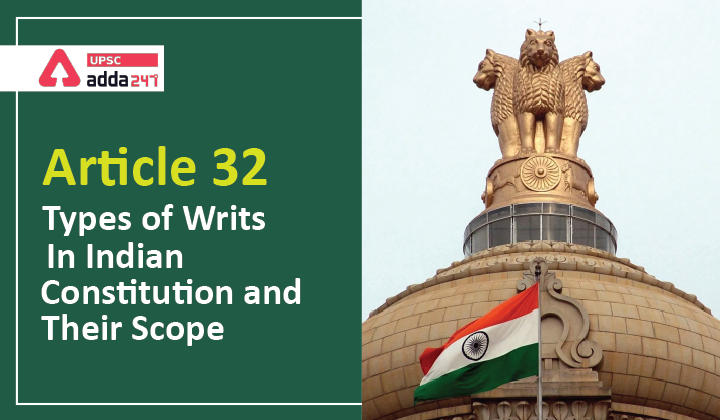Table of Contents
Type of Writs in Indian Constitution- Relevance for UPSC Exam
- GS Paper 2: Indian Constitution- Historical underpinnings, evolution, features, amendments, significant provisions and basic structure.
Type of Writs in Indian Constitution- Context
- Constitutional Writs are directions or orders issued by the Supreme Court or High Courts that command constitutional remedies for Indian Citizens against the violation of their fundamental rights.
Type of Writs in Indian Constitution- Key Points
- About: The supreme court and High courts have the power to issue writs in the nature of habeas corpus, quo warranto, mandamus, certiorari, prohibition, etc., under Arts. 32 and 226 respectively.
- Borrowing from Britain: Constitutional writs have been borrowed in India from the British Constitution where they are known as ‘Prerogative writs’.
- Guarantor of Fundamental Rights: The right to constitutional remedies is a guarantor of all other fundamental rights available to the people of India.
- Power to Issue Constitutional Writs: Article 32 of the constitution provides the Supreme Court to issue writs for enforcement of Fundamental Rights (FRs).
- Article 226: It confers power on High Courts to issue writs to any person or authority within their jurisdiction for enforcement of Fundamental Rights or any other legal rights.
- Extension of Writ Jurisdiction: Article 32 also provides a clause that empowers Parliament to confer on the supreme court power to issue writs, for purposes other than those mentioned above.
- Types of Writs: There are five types of writs in the Constitution-
- Habeas corpus,
- Mandamus,
- Prohibition
- Certiorari and
- Quo-Warranto,
- Habeas corpus and Quo warranto being confined to specific situations, Certiorari and Mandamus are the two most commonly sought writs to control the actions of administrative bodies.
Type of Writs in Indian Constitution- Habeas corpus
- About: Latin meaning of the word Habeas corpus is ‘To have the body of.’ This protects the Fundamental Right of individual liberty against illegal detention.
- Reason for Issuing Habeas Corpus Writ: The Habeas Corpus writ is issued by Supreme Court/High Court.
- Under Habeas Corpus Writ, SC/HCs orders one person who has arrested another person to bring the body of the latter before the court.
- Scope of Habeas Corpus Writ: It can be issued by the SC/HCs against both private and public authorities. Habeas Corpus Writs can not be issued in the following situations-
- When detention is lawful
- When the proceeding is for contempt of a legislature or a court
- Detention is by a competent court
- Detention is outside the jurisdiction of the court.
Classification of Directive Principles of State Policy (DPSPs)
Type of Writs in Indian Constitution- Mandamus Writ
- About: Mandamus means ‘We Command’. The SC/HCs issue Mandamus writs to order the public official who has failed to perform his duty or refused to do his duty.
- Mandamus Writ is issued by the courts to force public authorities to resume their work.
- Mandamus Writ is issued by courts to direct a public authority to do its duty.
- Scope of Mandamus Writ: Besides public officials, Mandamus can be issued against any public body, a corporation, an inferior court, a tribunal, or government for the same purpose.
- Mandamus Writ can not be issued against Private individuals (unlike Habeas Corpus).
- Mandamus Writ can’t be issued in the following situations-
- For enforcing departmental instruction that does not possess statutory force
- For ordering someone to work when the kind of work is discretionary and not mandatory
- For enforcing a contractual obligation
- Mandamus writ can’t be issued against the Indian President or State Governors
- Mandamus writ can’t be issued against the Chief Justice of a High Court acting in a judicial capacity.
44th Constitutional Amendment Act
Type of Writs in Indian Constitution- Prohibition
- About: Prohibition simply means ‘To forbid.’ Prohibition writ directs inactivity on the part of lower judicial courts.
- Mandate of ‘Prohibition’: It is issued by a higher court against a lower court to prevent the latter from exceeding its jurisdiction or usurping a jurisdiction that it does not possess.
- Scope of Prohibition Writ: Prohibition writ can only be issued against judicial and quasi-judicial authorities.
- Prohibition Writ can’t be issued against administrative authorities, legislative bodies and private individuals or bodies.
42nd Constitutional Amendment Act, 1976
Type of Writs in Indian Constitution- Certiorari
- About: Certiorari meaning is ‘To be certified’ or ‘To be informed.’ power of the higher court to remove a proceeding from a lower court and bring it before itself.
- Grounds for issuing Certiorari Writ: The Writ of Certiorari is issued on the following grounds-
- An excess of jurisdiction or
- Lack of jurisdiction or
- An error of law.
- Mandate of Certiorari Writ: It is issued by a higher court (in authority) to a lower court or tribunal ordering them-
- Either to transfer a case pending with them to itself or
- Quash the order of the lower court in a case.
- Scope of Certiorari Writ:
- Initially, Certiorari Writ was issued only against judicial and quasi-judicial authorities but later its scope was extended to include even administrative authorities.
- Certiorari Writ cannot be issued against legislative bodies and private individuals or bodies.
List of Major Constitutional Amendment Acts- Part 1
Type of Writs in Indian Constitution- Quo-Warranto
- About: Literal meaning of ‘Quo-Warranto’ is ‘By what authority or warrant.’ It reviews the actions of the administrative authorities who make the appointments to the public offices.
- The court enquires into the legality of a claim of a person to a public office using the writ of ‘Quo-Warranto’.
- Grounds for issuing Quo-Warranto: This writ is issued by the court to public officials to enquire about what authority they hold the public office.
- Scope of Quo-Warranto Writ:
- The Writ of Quo-Warranto can be invoked only when the substantive public office of a permanent character created by a statute or by the Constitution is involved.
- The Writ of Quo-Warranto is not available against the private or ministerial office.
List of Major Constitutional Amendment Acts- Part 1
List of Major Constitutional Amendment Acts- Part 2
List of Major Constitutional Amendment Acts- Part 3




 TSPSC Group 1 Question Paper 2024, Downl...
TSPSC Group 1 Question Paper 2024, Downl...
 TSPSC Group 1 Answer key 2024 Out, Downl...
TSPSC Group 1 Answer key 2024 Out, Downl...
 UPSC Prelims 2024 Question Paper, Downlo...
UPSC Prelims 2024 Question Paper, Downlo...




